How indigenous australians try to preserve themselves
- 作者: Artemova O.Y1,2, Artemova Y.A2
-
隶属关系:
- Institute of Ethnology and Anthropology, Russian Academy of Sciences
- Russian State University for the Humanities
- 期: 编号 5 (2023)
- 页面: 143-177
- 栏目: Articles
- URL: https://journal-vniispk.ru/0869-5415/article/view/233755
- DOI: https://doi.org/10.31857/S086954152305010X
- EDN: https://elibrary.ru/YEEPJS
- ID: 233755
如何引用文章
全文:
详细
作者简介
O. Artemova
Institute of Ethnology and Anthropology, Russian Academy of Sciences;Russian State University for the Humanities
Email: artemova.olga@list.ru
Y. Artemova
Russian State University for the Humanities
Email: redfox712002@yandex.ru
参考
- Артемова О.Ю. Некапиталистический этос в орбите капиталистического // Новые российские гуманитарные исследования. 2016. Вып. 11. http://www.nrgumis.ru/articles/1994
- Артемова О.Ю. Настоящий охотник - бедный охотник? ("Моральная экономика" и некоторые проблемы социальной эволюции) // Stratum plus. Археология и культурная антропология. 2018. № 1. С. 77-102.
- Берндт Р.М., Берндт К.Х. Мир первых австралийцев. М.: Наука, 1981.
- Bateson G. Culture Contact and Schismogenesis // Man. 1935. Vol. 35. P. 178-183. https://doi.org/10.2307/2789408
- Berndt R.М., Berndt С.H. The World of the First Australians. Sydney: Ure Smith, 1964.
- Bird-David N. The Giving Environment: Another Perspective on the Economic System of Gatherer-Hunters // Current Anthropology. 1990. Vol. 31 (2). P. 189 -196.
- Bird-David N. Beyond "The Hunting and Gathering Mode of Subsistence": Culture-Sensitive Observations on the Nayaka and Other Modern Hunter-Gatherers // Man. 1992. Vol. 27 (1). P. 19-44. https://doi.org/10.2307/2803593
- Graeber D., Wengrow D. The Dawn of Everything: A New History of Humanity. N.Y.: Farrar, Straus and Giroux, 2021.
- Kowal E. Trapped in the Gap: Doing Good in Indigenous Australia. N.Y.: Berghahn, 2015.
- Martin D.F. Does Native Title Merely Provide an Entitlement to Be Native? Indigenes, Identities, and Applied Anthropological Practice // Australian Journal of Anthropology. 2015. Vol. 26 (1). P. 112-127. https://doi.org/10.1111/taja.12121
- Martin D.F., Martin B.F. Challenging Simplistic Notions of Outstations as Manifestations of Aboriginal Self-Determination: Wik Strategic Engagement and Disengagement over the Past Four Decades // Experiments in Self-Determination: Histories of the Outstation Movement in Australia / Eds. N. Peterson, F. Myers. Canberra: Australian National University Press, 2016. P. 210-228.
- Peterson N. Demand Sharing: Reciprocity and Pressure for Generosity among Foragers. American Anthropologist. 1993. Vol. 95 (4). P. 860-874.
- Peterson N. From Mode of Production to Moral Economy: Sharing and Kinship in Fourth World Social Orders // Ninth International Conference on Hunting and Gathering Societies: Hunter-Gatherer Studies and the Reshaping of Anthropology. Edinburgh, the Edinburgh Conference Center, 2002.
- Peterson N. What Can the Precolonial and Frontier Economies Tell Us about Engagement with the Real Economy? Indigenous Life Projects and the Conditions for Development // Culture, Economy and Governance in Aboriginal Australia / Eds. D. Austin-Broos, G. Macdonald. Sydney: Sydney University Press, 2005. P. 7-18.
- Peterson N. On the Persistence of Sharing: Personhood, Asymmetrical Reciprocity, and Demand Sharing in the Indigenous Australian Domestic Moral Economy // Australian Journal of Anthropology. 2013. Vol. 24 (2). P. 166-176. https://doi.org/10.1111/taja.12036
- Peterson N. Place, Personhood and Marginalization: Ontology and Community in Remote Desert Australia // Anthropologica. 2015. Vol. 57 (9). P. 491-500.
- Peterson N. What Is the Policy Significance of the Hybrid Economy? // Engaging Indigenous Economy: Debating Diverse Approaches / Ed. W. Sanders. Canberra: Australian National University Press, 2016. P. 55-64.
- Peterson N. Beyond Narratives of Aboriginal Self-Deliverance: Land Rights and Anthropological Visibility in the Australian Public Domain // Anthropological Forum: A Journal of Social Anthropology and Comparative Sociology. 2022. Vol. 32 (2). P. 125-137. https://doi.org/10.1080/00664677.2022.2084716
- Sahlins М. Stone Age Economics. Chicago: Aldine-Atherton, 1972.
- Sutton P., Walshe K. Farmers or Hunter-Gatherers? The Dark Emu Debate. Melbourne: Melbourne University Publishing, 2021.
- Sutton P. The Politics of Suffering: Indigenous Australia and the End of the Liberal Consensus. Carlton: Melbourne University Press, 2009.
- Thomson D. Donald Thomson in Arnhem Land / Ed. N. Peterson. Carlton: Miegunyah Press, 2003.
- Woodburn J.C. Sharing Is Not a Form of Exchange: An Analysis of Property-Sharing in Immediate Return Hunter-Gatherer Societies // Property Relations: Renewing the Anthropological Tradition / Ed. C.M. Hann. Cambridge: Cambridge University Press, 1998. P. 48-63.
补充文件









